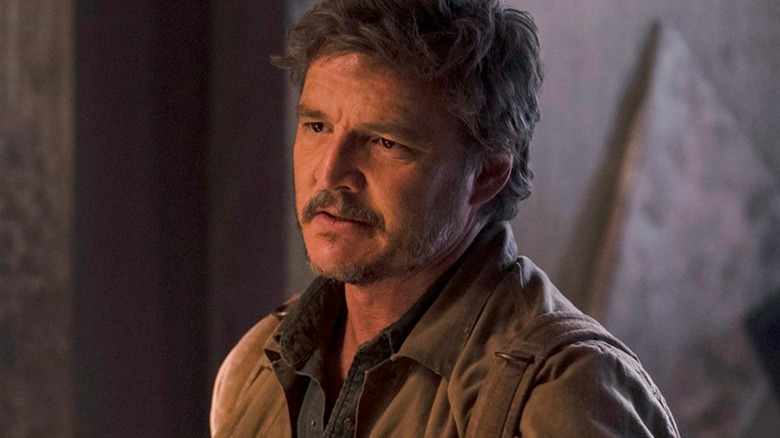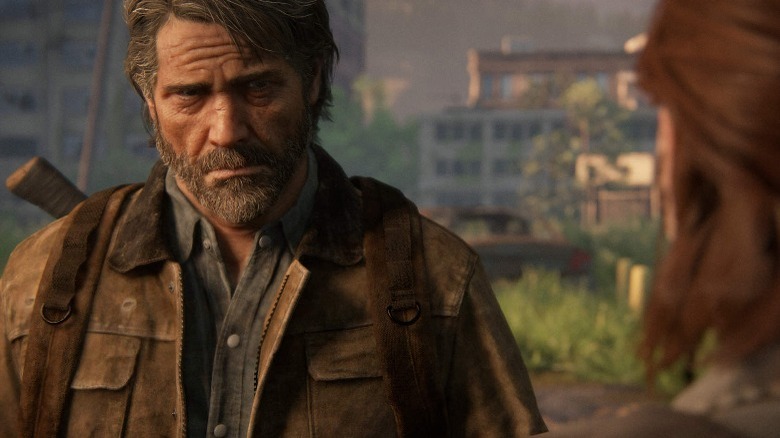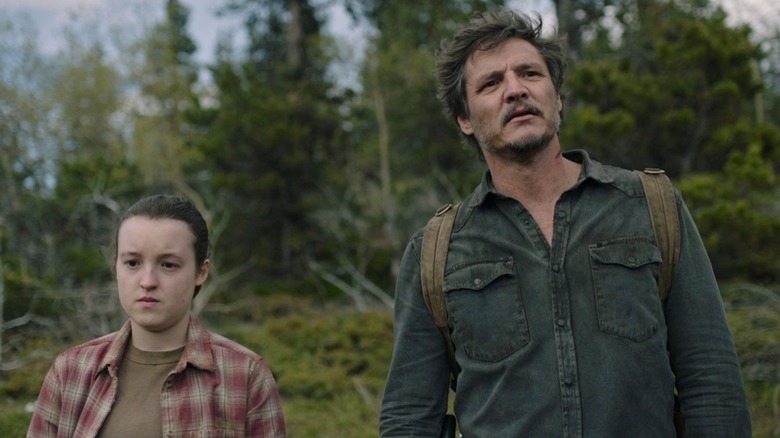Will The Last Of Us Season 2 Include The Second Game's Shocking Twist? Pedro Pascal Sounds Off
This post contains spoilers for "The Last of Us Part II."
HBO's "The Last of Us" managed to create a compelling video game adaptation by adhering to the dual strategy of staying true to the roots of the game while expanding upon aspects that warranted greater narrative depth. This approach has worked in the show's favor so far, as reflected in the overwhelmingly positive response towards episodes like "Long, Long Time" and "Endure and Survive," which fleshed out backstories for supporting characters in meaningful ways. A good adaptation always finds ways to improve upon its source material, and "The Last of Us" has succeeded in doing so thanks to the passionate involvement of series creators Craig Mazin and Neil Druckmann, who innately understand the heart of this tragic apocalyptic tale.
Joel Miller (Pedro Pascal) contains multitudes. A hardened survivor who has dealt with his share of personal losses, Joel has done some pretty heinous stuff over the years in order to survive. However, there's nuance to the character — beneath his tough-guy exterior, there's lethal protectiveness and vulnerability, fueled by trauma, loss, and the hope of filling a gaping void inside his soul. These complexities grant Joel a certain brand of likability, which makes his imminent fate in "Part II" especially tragic, as it will be a major turning point for Ellie (Bella Ramsey), who chooses to walk the dangerous path of revenge from that point on.
There seems to be a schism in terms of the different approaches that might work for the next installment in the series, which is currently in development. Pascal recently told Esquire about his perception of how the central twist in "Part II" might be handled, while Mazin has expressed a slightly different sentiment about how the story might evolve after season 1.
Staying true to canon
Those who've played "The Last of Us Part II" are aware of the shocking, tragic central event in the game's opening act, where Joel is brutally, unceremoniously murdered by Abby (voiced by Laura Bailey), the daughter of the surgeon Joel had killed to save Ellie from imminent death. As the core appeal of the first game is the relationship between Joel and Ellie, this sudden loss destabilizes us. But that is very much the point, as Joel's absence is meant to be earth-shattering for Ellie, whose fate will now be shaped by how she chooses to react to this loss. Although Joel has always been pivotal to "The Last of Us," it has always been Ellie's story, tracking her from a hopeful, wide-eyed teen to a bitter, revenge-fueled adult struggling to find her place in her world.
When Pascal was asked whether season 2 of the show would be staying true to Joel's fate in the games, the actor clarified that he has no idea about the direction the writers will venture into, but hopes that the show won't deviate too much:
"It wouldn't make sense to follow the first game so faithfully only to stray severely from the path. So, yeah, that's my honest answer."
In the same interview, Mazin explained that he doesn't "fear killing characters," but also notes that he and Druckmann do not "feel constricted by the source material." Some amount of liberty might be taken in the way the show portrays or paces Joel's death, and it remains to be seen how it fares in the context of the larger storyline. In the meantime, let's talk about the repercussions of Joel's fate when it comes to molding Ellie's path ahead as a central character.
Why Part II needs to include this imminent tragedy
Although it is too early to speculate about the narrative direction of season 2, in that same interview Ramsey voiced their anxiety about the tragic death, unsure whether they are "emotionally ready for it" if it does take place in the show. A follow-up without the integral Joel-Ellie dynamic would feel strange at first, but this sentiment captures the cruel absurdity of loss in a world in which nothing can be taken for granted. Another reason why Joel's absence feels so pointed for Ellie in the second game is that her relationship with him has frayed over the years — the aftermath of the hospital event and Joel's decision to lie consistently to shield her from the truth has directly affected the bond they share.
Joel's murder is so brutal and sudden that it is difficult to stomach, especially after players/audiences spend a significant time investing in his arc and rooting for him. Joel's instinctive decision to save Ellie and doom the world in the process is extremely complex and layered. On the one hand, he robs her of a real choice to follow her purpose, but on the other, wouldn't any of us do exactly what Joel does, if we were in his shoes? When a single individual is our home, our world, the choice between the fate of the entire human race versus the well-being of a loved one feels almost too easy. But it isn't, and actions, no matter how intensely rooted in love, have consequences.
"The Last of Us: Part II" needs to stay true to Joel's fate for Ellie to lose and eventually find herself. There might be diversions in the path and fresh alleyways to explore, but the labyrinth leads to a definitive end, where loss begets tragedy, often bringing out the worst in us.


